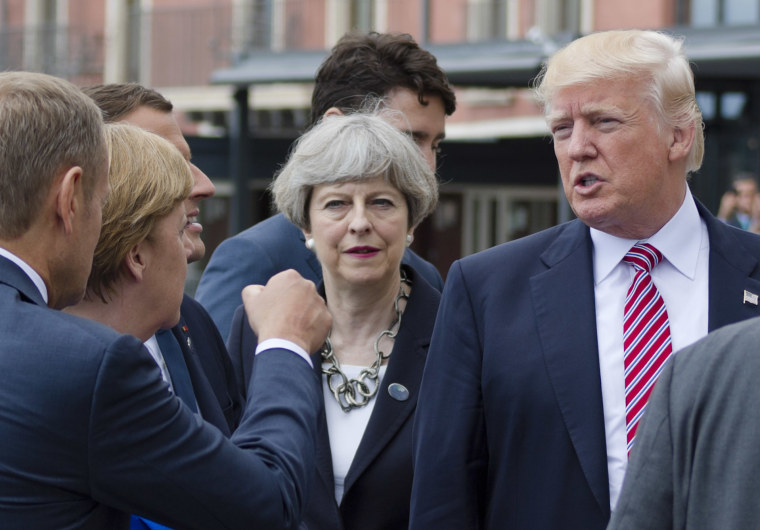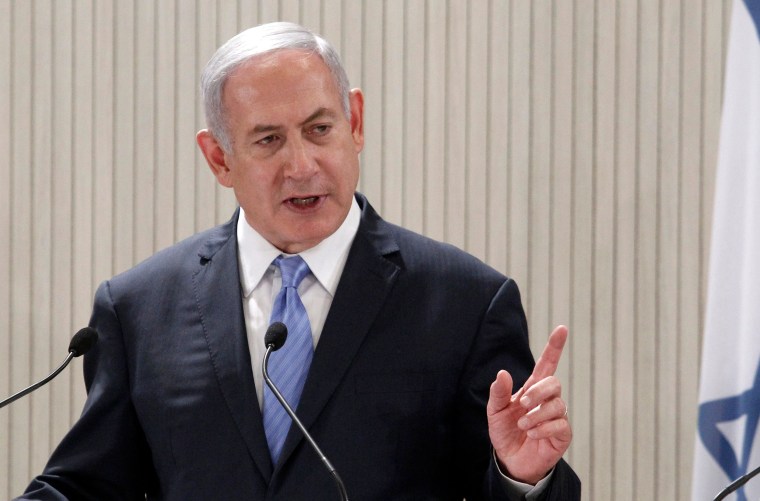Key European allies expressed grave concerns over President Donald Trump's decision to withdraw the U.S. from the Iran nuclear agreement on Tuesday, vowing to continue the work of limiting Iran's nuclear program while urging the U.S. not to jeopardize gains already made under the deal.
In a joint statement issued after Trump's announcement, French President Emmanuel Macron, British Prime Minister Theresa May and German Chancellor Angela Merkel implored Iran "to show restraint" following the decision and called on the U.S. "to do everything possible to preserve the gains for nuclear nonproliferation brought about by the JCPOA, by allowing for a continued enforcement of its main elements."
Macron also tweeted that the three countries, America and Iran's partners in the JCPOA, or Joint Comprehensive Plan of Action, "regret" the U.S. decision, adding that the nations would "work collectively on a broader framework" moving forward.
Trump announced his decision to leave the JCPOA Tuesday afternoon, reneging on the landmark Obama-era accord, which also includes Russia and China, and raising the question of whether Tehran might respond by resuming its frozen weapons program.
Trump also said that he would impose the "highest level" of economic sanctions, which would affect not only Iran but other countries that do business with it.
In 2015, Iran agreed to halt its pursuit of nuclear weapons — and to allow international checks on its facilities — in exchange for moves by the U.S., several other countries and the United Nations to roll back sanctions that had crippled its economy.

Iranian President Hassan Rouhani, in a televised speech, said though America's withdrawal amounted to "psychological warfare," it would continue its talks with the remaining parties to the deal.
"We've known for months that President Trump wouldn't be committed to this deal," Rouhani said. "The Iranian foreign ministry will continue talks with remaining countries in the deal."
"I want to emphasize that people should not have any worries about the future of this country," he added. "The people are more united than ever, and there will be peace and stability in Iran."
Syrian state media also reported that the country is standing behind Iran and condemned Trump's withdrawal, saying it "proved the U.S. is not committed to international agreements."

Israeli Prime Minister Benjamin Netanyahu, who has been a consistent critic of the deal, cheered Trump's decision, saying the agreement did not block Iran's path to a nuclear bomb and the current framework of the deal was a "recipe for disaster."
"The deal didn't push war further away, it actually brought it closer. The deal didn't reduce Iran's aggression, it dramatically increased it," he said at a news conference Tuesday. "This is why Israel thinks that President Trump did a historic move, and this is why Israel thanks President Trump for his courageous leadership."
Prince Khalid bin Salman, the Saudi ambassador to the U.S., also tweeted his support of Trump's actions, saying that the country "always had reservations" about the agreement.
The United Arab Emirates' minister of state for foreign affairs, Anwar Gargash, also hailed the U.S. decision and called the agreement a "flawed deal."
"The veneer of Tehran’s compliance contradicted its bellicose policies," he said in a tweet. "President Trump’s decision is the correct one."